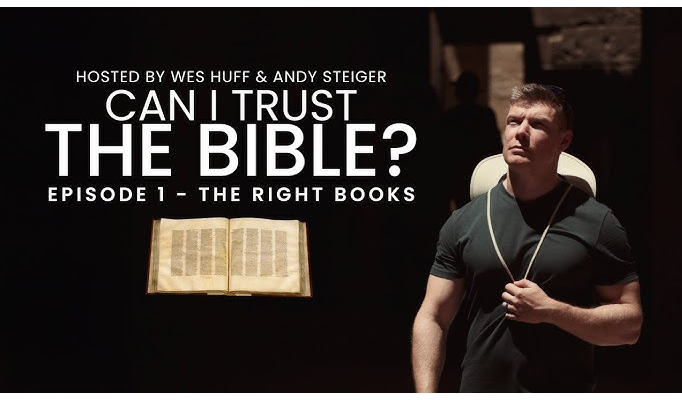
In just a few short months Apologetics Canada presence on social media has surged in influence, exploding to over 100,000 followers on YouTube, kicking off production on episodes three and four of its docuseries, Can I Trust the Bible?, and hosting a sold-out apologetics conference in Abbotsford, British Columbia.
What accounts for the organization’s recent growth in popularity? It can be attributed in no small way to a cultural moment sparked by a debate between Apologetics Canada’s own New Testament scholar and Central Canada Director, Wesley Huff, and YouTube personality and CEO of 4bidden Knowledge, Billy Carson. Late last year, Carson – who has built a career, in-part, by attempting to debunk biblical history with ancient texts – was invited to come on Elevating Beyond, a YouTube podcast hosted by his then-friend, Mark Minard. A day before filming, an invite was extended to Huff to join the debate. He agreed, drawing on his expertise as a scholar of biblical manuscripts, a subject he has explored on his own YouTube channel since beginning his PhD in 2017.
What followed propelled Huff into YouTube stardom, with the debate being hailed as “a masterclass in apologetics” by Carey Nieuwhof and “the most beautiful dismantling I’ve ever seen in an internet debate” by The Daily Wire’s, Michael Knowles. Just 15-minutes into the discussion, Carson was forced to back-pedal statements regarding the Sinai Bible and the infamous Gospel of Jesus’ Wife, a text widely recognized as a forgery in academic circles. At one point, Carson even claimed that, according to the Sinai Bible, Jesus was never crucified. Huff, seeking clarification, asked if Carson was referring to Codex Sinaiticus, a fourth-century manuscript of the Greek Bible, which Carson affirmed. Without hesitation, Huff calmly reached behind him, retrieved his own copy of the Codex from the shelf, and opened it. “This is an almost complete copy of the Gospel of John,” Huff said, turning to a page showing Papyrus 66 (𝔓66), a near complete manuscript facsimile of John’s Gospel. “It has the crucifixion.” Carson began flipping through his phone before claiming that he misspoke, saying he had meant to reference the Gospel of Barnabas instead. But Huff was prepared. Without missing a beat, he delivered a concise history of the Gospel’s medieval origins, including its quotation of Dante’s Inferno, effectively dismantling Carson’s argument.
This was just one example of the intellectual jiuui-jitsu Huff demonstrated throughout the discussion. The ripple effect was massive. Atheists who had believed the claims of Carson for years were soon questioning their (anti-)faith positions. One top YouTube comment captured the impact: “Wes has single handedly dismantled my entire world view on the Abrahamic doctrines. Not only do I realize how incorrect I’ve been my entire life, I am beginning to believe the Christians may actually be right about everything.” Sensing the potential fallout, Carson issued a cease-and-desist letter to Minard only hours after the recording. He later demanded that Huff remove the unedited original video and stop releasing clips from the podcast as well. But unfortunately for Carson, the legal action only drew more attention to the debate, further amplifying its reach, and the online buzz eventually caught the eye of one of YouTube’s most influential figures – Joe Rogan.
A controversial figure in his own right, Rogan has built a massive following, with his podcast, The Joe Rogan Experience, amassing a whopping 19.5 million subscribers. The comedian and UFC commentator has interviewed some of the world’s most influential – and polarizing – people, including Jordan Peterson, Donald Trump and Elon Musk. Notably, Rogan has been notorious for publicly challenging the Christian faith, even having Carson as a guest on his podcast in June 2024. Yet, with an invitation extended to Huff, the tide appears to be turning. Where Rogan was once outspoken about the supposed delusions of Christians, his conversation with Huff revealed a changing perspective. “Atheists, they vary just like Christians vary,” said Rogan. “But the worst versions of them are essentially believers in the religion of atheism. They worship the concept of there being no God… and that to me is always so arrogant.”
Huff’s interview on the Joe Rogan Experience has now surpassed 6.3 million views, sparking countless reaction videos, reels, and articles. For Huff, the exposure has led to a surge of over half a million subscribers, and the ripple effect extends beyond his personal growth – Apologetics Canada is also reaping the benefits.
Coinciding with the release of the Rogan interview, Apologetics Canada, coincidentally, launched the first two episodes of its own documentary series, Can I Trust the Bible, providing an in-depth exploration of the Bible’s origins and composition. The timing was impeccable. Thousands of viewers, drawn in by Huff’s Rogan appearance, immediately flocked to the documentary, catapulting Apologetics Canada into the spotlight. As a result, the organization is experiencing steady growth and fielding multiple partnership requests – from institutions like the Museum of the Bible in Washington D.C., to digital platforms like YouVersion Bible.
In the coming weeks, ‘Can I Trust the Bible? will begin filming its next installment. Huff and Apologetics Canada president and founder, Andy Steiger, will travel to Europe to discuss the question, how did we get the Bible? And on what grounds can Christians claim that this particular collection of books constitutes our Scriptures? This journey will explore the historical, theological, and textual foundations of the Bible, equipping viewers with a deeper understanding of its reliability and significance.
Sign up to get your copy of the series FOR FREE at https://bible.apologeticscanada.com.

Leave a Reply